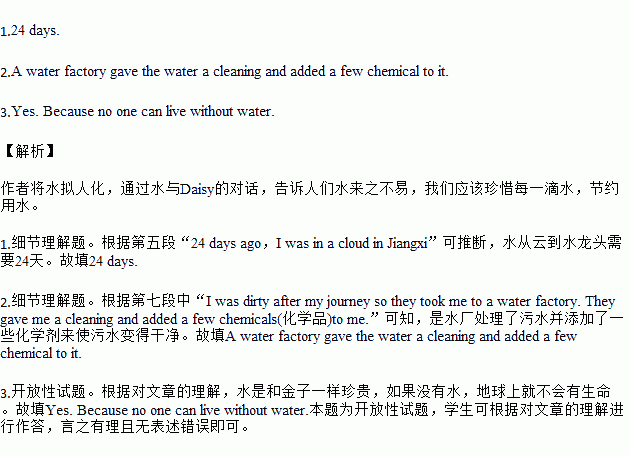题目内容
Daisy was in the bathroom of her flat. She was brushing her teeth and the tap(水龙头) was on. Water was coming into the sink.
"Turn that tap off, " a voice said loudly. Daisy looked round, but saw no one. "Turn that tap off. You're wasting water, " the voice sounded again.
"Who…who are you?" "I'm water. It's not easy for me to get here. Do you know where I'm from?"
"From the tap,of course. "said Daisy.
"Yes, yes, but before that?" the voice said. "24 days ago,I was in a cloud in Jiangxi, enjoying the sights comfortably. Then the cloud dropped me into a stream and I ran down the mountain into the Yangtze River. It carried me to a lake. I stayed there for a few days, and then I travelled a long way and ran into the Huangpu River. Then it was time to get cleaned up. "
"Cleaned up?" Daisy was surprised.
"Yes. I was dirty after my journey so they took me to a water factory. They gave me a cleaning and added a few chemicals(化学品)to me. Then I travelled in the pipes under the streets. I waited there until you called me,and here I am. "
Daisy said,"So this is the end of your journey. "
"No. When you've finished with me, I'll go to a sewage plant(污水处理厂). Then they'll pour me into the river and I'll be back in the sea again. "
"Again?"
"Yes. That' s where I came from in the first place. Remember not to waste me or make me dangerously dirty. I' m precious(珍贵)like gold. See you. "
"Wait a minute. What do you mean by that?" But there was no answer. The water left.
1.How long was the water's journey from a cloud to the tap?
__________________________________________________________________
2.How did the water get cleaned up?
__________________________________________________________________
3.Do you think water is precious like gold? Why or why not?
__________________________________________________________________
papa Marko's-Pizza to go- Large $250 Medium $180 Small $100 Ready in 15minutes Open at noon 7 days a week Call 1234-56 | Apple Tree Bakery ~Handmade Bread and Cookies~ Open at 6 o' clock every morning 20% off after 8 p.m. |
GOOD TASTE EAST FOOD Hamburgers, Hot dogs, Drinks 10:00a.m. to 11:30 p.m. every day -THE BEST IN TOWN- | Winnie's Sandwich Club ~All you can eat~ $180 a person $120 for children under 12 Lunch hours:11 a.m.~2 p.m. Dinner hours:5 p.m.~8 p.m. Closed on Sundays |
1.Lisa has to get to school before 7:00 this morning. On her way to school, where can she buy her breakfast?
A.At Apple Tree Bakery. B.At Papa Marko’s.
C.At Good Taste Fast Food. D.At Winnie’s Sandwich Club.
2.Lisa can go to any place for lunch on Sundays EXCEPT(除了) ________.
A.Papa Marko’s B.Apple Tree Bakery
C.Good Taste Fast Food D.Winnie’s Sandwich Club
3.If Lisa buys some food for $150 at Apple Tree Bakery at 9.30 p.m., she will save________.
A.$ 80 B.$20 C.$30 D.$120
4.Which statement is wrong?
A.They are all advertisements for food.
B.Good Taste Fast Food is the best in town.
C.You can’t have a meal till noon at Papa Marko’s.
D.There are too many people at Papa Marko’s, so you’ll have to wait a long time.

